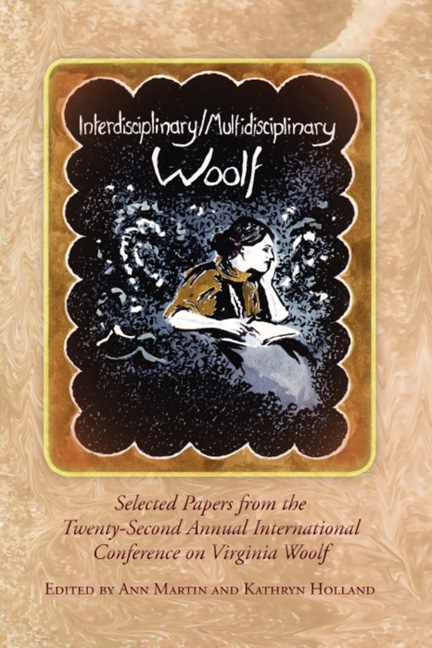Book contents
- Frontmatter
- Contents
- Introduction to Interdisciplinary/Multidisciplinary Woolf
- Acknowledgments
- List of Abbreviations
- History, Materiality, Multiplicity
- Multidisciplinary Woolf / Multiple Woolfs?
- Woolf, History, Us
- “Full of Experiments and Reforms”: Virginia Woolf, John Maynard Keynes, and the Impossibility of Economic Modeling
- Desiring Statues and Ambiguous Sexualities in Jacob's Room
- Challenging the Family Script: Woolf, the Stephen Family, and Victorian Evangelical Theology
- History as Scaffolding: Woolf's Use of The Times in The Years
- Vincent van Gogh, Virginia Woolf, and Old Shoes: A Cross-Cultural Iconography of Historical Truama from the Great War to the Iraq War
- Stopped at the Border: Virginia Woolf and the Criminalization of Dissent in Democratic Societies
- “Q. And babies? A. And babies”: On Pacifism, Visual Truama, and the Body Heap
- Photography, History, and Memoir of the Spanish Civil War: Interdisciplinary Views
- Patterns, Practices, Principles
- Art, Influence, Embodiment
- Publishing, Politics, Publics
- Notes on Contributors
- Conference Program
Challenging the Family Script: Woolf, the Stephen Family, and Victorian Evangelical Theology
from History, Materiality, Multiplicity
- Frontmatter
- Contents
- Introduction to Interdisciplinary/Multidisciplinary Woolf
- Acknowledgments
- List of Abbreviations
- History, Materiality, Multiplicity
- Multidisciplinary Woolf / Multiple Woolfs?
- Woolf, History, Us
- “Full of Experiments and Reforms”: Virginia Woolf, John Maynard Keynes, and the Impossibility of Economic Modeling
- Desiring Statues and Ambiguous Sexualities in Jacob's Room
- Challenging the Family Script: Woolf, the Stephen Family, and Victorian Evangelical Theology
- History as Scaffolding: Woolf's Use of The Times in The Years
- Vincent van Gogh, Virginia Woolf, and Old Shoes: A Cross-Cultural Iconography of Historical Truama from the Great War to the Iraq War
- Stopped at the Border: Virginia Woolf and the Criminalization of Dissent in Democratic Societies
- “Q. And babies? A. And babies”: On Pacifism, Visual Truama, and the Body Heap
- Photography, History, and Memoir of the Spanish Civil War: Interdisciplinary Views
- Patterns, Practices, Principles
- Art, Influence, Embodiment
- Publishing, Politics, Publics
- Notes on Contributors
- Conference Program
Summary
It is well known that Virginia Woolf was a feminist who had little time for Christianity. She has often been described as an agnostic like her parents; more recently, she has been regarded as an atheist, on the basis of statements such as “certainly and emphatically there is no God” (MB 84). It is therefore curious that the Woolfs’ library at Washington State University includes a small but significant selection of books on religion. These have often been assumed to be Leonard's contribution to the collection but as this paper will demonstrate, a significant number of these works were Virginia's. The paper will show that she read some of those books with a detached, critical interest and that they informed her critique of patriarchy and its interconnections with organized religion.
The religious books in the Woolfs’ library include several that were written by her ancestors in the Stephen family. These formed part of Leslie Stephen's library that the young Virginia was given complete leave to explore and that she eventually inherited. The library is in part a chronicle of the family history of authorship for it showcases works by family members. Woolf's great-grandfather James Stephen is represented in the collection by his Considerations on Imprisonment for Debt. There are three editions of Essays in Ecclesiastical Biography by Woolf's grandfather Sir James Stephen. Works by Sir James's brother, Sir George Stephen, include The Life of Christ and two copies of his theologically literate novel, The Jesuit at Cambridge. Woolf's uncle James Fitzjames Stephen is represented by Essays by a Barrister and a collection of articles from the Saturday Review, Horae Sabbaticae. There is also a bound collection of pamphlets from the Metaphysical Society, including contributions from Fitzjames and Leslie. Her aunt C.E. Stephen is represented by two editions of Quaker Strongholds, Light Arising: Thoughts on the Central Radiance and a pamphlet criticizing Christian Science.
The collection also includes works the Stephens had owned, thus betraying the influence of the Clapham Sect, to which they belonged.
- Type
- Chapter
- Information
- Interdisciplinary/Multidisciplinary Woolf , pp. 35 - 40Publisher: Liverpool University PressPrint publication year: 2013

